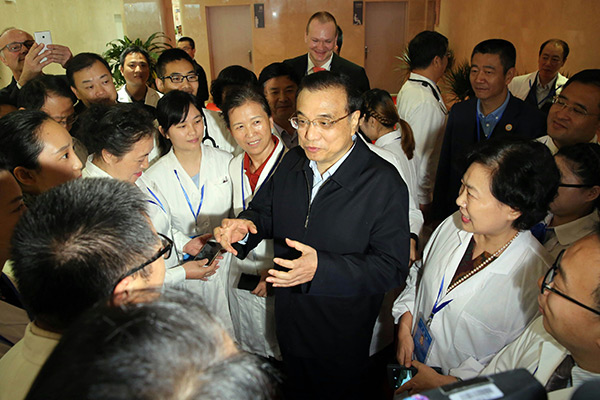
Premier Li Keqiang talks to healthcare workers at the Boao Lecheng International Medical Tourism Pilot Zone on March 25 in South China’s Hainan province.
The State Council has issued many policies in 2016 to integrate medical insurance in urban and rural areas and to promote China’s medical reform.
Deepening medical reform
“The development of medical industry is the primary need of people’s livelihood, and also the need of China’s development,” said Premier Li Keqiang, who urged upgrading the medical industry and approved main tasks for its 2016 reform, during the State Council executive meetings on Feb 14 and April 6 respectively.
To aid the policy implementation, the State Council issued a guideline in March, clarifying seven tasks for the sound development of medical industry, including developing modern logistics and establishing credibility of medical system.
In April, the State Council released key tasks for the 2016 medical reform, which included deepening reform on public hospitals, building hierarchy system of treatment, improving national medical insurance and amplifying mechanism of medicine supply.
In June, the State Council approved a plan on experimental changes to the drug licensing system, and issued a guideline to promote big data’s application to the industry at the end of the month.
Traditional Chinese medicine development
Efforts also have been made for the development of traditional Chinese medicine. “With the fast growth of the traditional Chinese medicine industry in recent years, we should continue to issue policies on targets,” said the Premier.
The executive meeting on Feb 14 decided to further promote the development of the industry, and then issued the outline of the plan, approving seven tasks between 2016 and 2030. The efforts included improving service network covering urban and rural areas, integrating the development of different varieties of medicine, and stepping up applying “Internet Plus” strategy to traditional Chinese medicine.
“We should promote the connection of medical treatment, medical insurance and medicine,” said the Premier, who noted in 2016 government work report that efforts would be made to integrate medical insurance in rural and urban areas, and average subsidies would be increased from 380 yuan ($57) to 420 yuan ($63) per person per year.
Medical insurance integration and public concerns
Earlier this year, the State Council issued a circular, highlighting the integration of medical insurance in urban areas with new rural cooperative medical system.
On settling public’s concerns on vaccine, Premier Li said that the quality of vaccine concerns the lives and health of the general public, especially children’s, which is the bottom line that on one is allowed to violate it.
The State Council executive meeting on April 13 heard reports on the case of illegal traffic of vaccine in Jinan, Shandong province, deciding to conduct thorough investigation and strengthen supervision.
In late April, the State Council revised the regulations on the management of vaccine circulation and vaccination, deciding to improve the sales of the second type vaccine and legal system of logistics, and to intensify responsibility and punishment.
